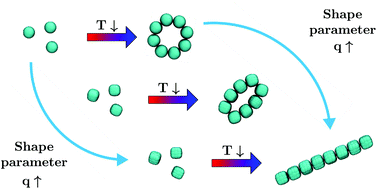Abstract
Systems whose magnetic response can be finely tuned using control parameters, such as temperature and external magnetic field strength, are extremely desirable, functional materials. Magnetic nanoparticles, in particular suspensions thereof, offer opportunities for this controllability to be realised. Cube-like particles are particularly mono-disperse examples that, together with their favourable packing behaviour, make them of significant interest for study. Using a combination of analytical calculations and molecular dynamics we have studied the self-assembly of permanently magnetised dipolar superballs. The superball shape parameter was varied in order to interpolate the region between the already well-studied sphere system and that of the recently investigated cube. Our findings show that as a superball particle becomes more cubic the chain to ring transition, observed in the ground state of spherical particles, occurs at an increasingly larger cluster size. This effect is mitigated, however, by the appearance of a competing configuration; asymmetric rings, a conformation that we show superballs can readily adopt.



 Please wait while we load your content...
Please wait while we load your content...